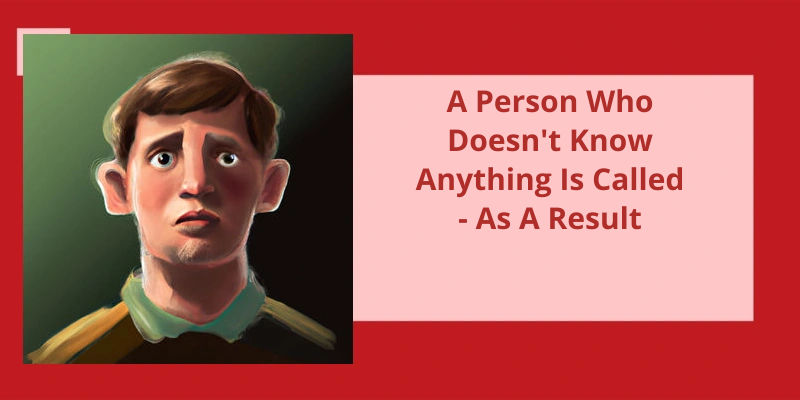In the vast landscape of knowledge and information, there exists a unique and intriguing category: a person who doesn't know anything. This individual, often labeled as an "ignoramus" or a "blank slate," finds themselves at a remarkable crossroads of curiosity and potential. Far from being a deficiency or a limitation, their lack of knowledge becomes a canvas upon which they can paint the colors of discovery and growth. As a result, this person embarks on a journey to seek understanding, embracing the vast possibilities that await them. While society might view their lack of knowledge as a handicap, it becomes their greatest asset, fueling their insatiable hunger for wisdom and enlightenment. Through their determination and willingness to explore the unknown, they transcend the boundaries of ignorance and transform into a beacon of curiosity, inspiring others to embrace the beauty of learning and the limitless potential of the human mind.
What Do You Call Someone Who Never Knows Anything?
When it comes to individuals who lack knowledge or understanding, there are various terms that are commonly used. One such term is “ignorant,” which implies a general lack of awareness or information. An ignorant person may know very little or nothing at all about a particular topic. It’s important to note, however, that being ignorant doesn’t necessarily mean a person is unintelligent; it simply means they lack knowledge in a specific area.
Another term that’s often used is “illiterate,” which generally refers to someone who’s unable to read or write. Illiteracy can be a result of limited educational opportunities or a lack of access to resources. Being illiterate can severely impact a persons ability to gain new knowledge or engage with written material.
Similarly, the term “unlettered” is used to describe someone who lacks formal education, particularly in terms of literacy and academic training. An unlettered person may have limited exposure to various subjects, making them less informed or knowledgeable in comparison to those who’ve received a formal education.
Additionally, “uneducated” is another term that signifies a lack of knowledge or training. This term encompasses a broader spectrum of learning, including both academic and practical knowledge. An uneducated person may lack understanding in formal subjects such as mathematics, science, or literature, as well as real-world skills and experiences.
While these terms highlight the lack of knowledge or understanding that someone may possess, they shouldn’t be used to judge or belittle individuals. It’s essential to approach these situations with empathy and understanding, recognizing that everyones learning journey is unique, and everyone has the potential to expand their knowledge and understanding.
Differentiating Between Ignorance and Lack of Intelligence: Explore the Distinction Between Being Ignorant and Being Unintelligent, Emphasizing That Ignorance Is Not a Reflection of a Person’s Overall Intelligence.
- Ignorance is the lack of knowledge or information on a particular subject.
- Being ignorant doesn’t necessarily mean a person is unintelligent.
- Intelligence refers to the ability to think, reason, and solve problems.
- Intelligent individuals can still be ignorant about certain topics.
- Ignorance can be overcome through education and gaining knowledge.
- Unintelligent individuals may lack the cognitive ability to understand or comprehend information.
- A person’s overall intelligence can’t be solely determined by their level of ignorance.
- It’s important to differentiate between ignorance and lack of intelligence to avoid negative judgments.
A know-it-all, also known as a know-all, is commonly referred to as someone who believes they possess knowledge on every subject and disregards any advice or information offered by others. Another term used to describe such individuals is egoist or egotist, highlighting their conceited and self-centered nature.
What Do You Call a Person That Thinks They Know It All?
When it comes to individuals who possess an inflated sense of knowledge and expertise, they’re often referred to as “know-it-alls.”. These individuals exhibit a characteristic disposition in which they perceive themselves as possessing a comprehensive understanding of various subjects, leaving little room for advice or information from others. A know-it-all can be described as an egoist, egotist, or even a swellhead due to their conceited and self-centered nature.
These individuals tend to disregard alternative perspectives, considering themselves as the ultimate authority on all matters. The moniker “know-all” efficiently captures this characteristic by highlighting their arrogant conviction of possessing an unparalleled understanding of various subjects.
Having an inflated sense of knowledge often leads to the exclusion of external ideas and advice. A know-it-alls self-centered nature prevents them from accepting input that challenges their perceived expertise. Such individuals seldom acknowledge information or insights that don’t align with their pre-existing beliefs, hindering their growth and potential for learning.
While these descriptions detail the characteristics of a know-it-all, it’s important to note that individuals may exhibit such behavior due to various reasons. Some may have deep-rooted insecurities, using their perceived knowledge as a defense mechanism to protect their fragile self-esteem. Others may simply lack the self-awareness to realize their limitations, leading them to overestimate their own capabilities.
This term encapsulates their tendency to dismiss the advice or information provided by others due to their arrogant belief in possessing unparalleled knowledge. While it’s important to recognize that these individuals may exhibit such behavior due to various underlying reasons, their refusal to accept alternative perspectives can hinder personal and intellectual growth.
This behavior of pretending to know less about something than one actually does can be described as disingenuous. Being disingenuous involves a lack of honesty and sincerity, as individuals attempt to deceive others by feigning ignorance or inexperience.
What Is the Word for Pretending to Know Something You Don T?
When it comes to encountering someone who’s pretending to know something they dont, the word that comes to mind is “disingenuous.”. Disingenuous is an adjective that perfectly captures the essence of behavior that lacks honesty and sincerity. It refers to individuals who intentionally conceal their actual knowledge on a topic, putting up a facade that they know less than they truly do. It’s both misleading and insincere, as these individuals pretend to be uninformed or clueless for various reasons.
For example, in social environments, some people may feign ignorance to avoid being in a position of vulnerability or to withhold information to manipulate others. In intellectual discussions, individuals may engage in disingenuous behavior to undermine the credibility of opposing viewpoints or to maintain an advantage in a debate. Such tactics harm the shared pursuit of knowledge and hinder the growth of a genuine, open conversation.
Recognizing a disingenuous person can be challenging, as their actions often involve subtle forms of deception or omission. They may hide their true understanding, intentionally mislead others, or claim an absence of knowledge on a given subject. However, their true intentions become evident when their façade is exposed or when inconsistencies in their statements arise. Such dishonest behavior ultimately erodes trust and undermines the authenticity of communication.
Though disingenuous behavior can be frustrating and detrimental, it’s essential to approach these situations with empathy and understanding. People who engage in this behavior may have underlying reasons or insecurities that drive their actions. By fostering an environment of genuine curiosity and open dialogue, individuals may be encouraged to shed their disingenuous façade and engage in a more honest exchange of ideas.
Whether motivated by personal gain, fear of vulnerability, or a desire to manipulate others, these individuals undermine the pursuit of knowledge and hinder genuine communication. Identifying such behavior can be challenging, but fostering an atmosphere of trust and open dialogue may encourage disingenuous individuals to shed their façade and engage in more authentic interactions.
The Psychological Motivations Behind Disingenuous Behavior
Disingenuous behavior refers to actions or communication that are deliberately deceitful or misleading. People engaging in this behavior may have various psychological motivations driving their actions. One common motivation is the desire to gain personal advantages or protect oneself from negative consequences. By being dishonest or withholding information, individuals may seek to manipulate others or avoid accountability for their actions.
Another psychological motivation behind disingenuous behavior is the need for social approval or acceptance. Some individuals may believe that presenting a false persona or hiding their lack of knowledge will make them appear more competent or knowledgeable. In certain cases, this behavior may stem from insecurity or fear of judgment, leading individuals to present a false image of themselves.
Furthermore, disingenuous behavior can also be driven by a desire to maintain control or power in a situation. By manipulating or distorting information, individuals may attempt to influence others or maintain a sense of superiority. This behavior can be a result of feelings of inadequacy or a need to exert control over others.
Ultimately, the psychological motivations behind disingenuous behavior vary from individual to individual. Understanding these motivations can help in recognizing and addressing such behavior, promoting open and honest communication in various contexts.
In the realm of knowledge and expertise, there exists a peculiar individual who deceives others by projecting a false sense of wisdom and proficiency. This person, commonly known as a charlatan, cleverly disguises their lack of knowledge and skill under a facade of confidence. With deceitful intentions, they aim to mislead and exploit the trust of those around them. Identified as a fraud or a quack, a charlatan is someone who pretends to know something they truly do not.
What Do You Call Someone Who Pretends to Know Something?
In the realm of knowledge and expertise, there exists a unique character known as a charlatan. This individual is someone who chooses to adopt a façade of knowledge and skills which they don’t actually possess. A charlatan is essentially a fraud, claiming to possess a level of understanding or proficiency that’s far beyond their capabilities. Such individuals amaze and manipulate others through their confident demeanor and overt claims of expertise.
This feigned knowledge often enables them to exploit unsuspecting individuals who’re seeking genuine advice or guidance. These self-proclaimed experts capitalize on the gaps in peoples knowledge, preying on their insecurities and vulnerabilities to manipulate them for their own benefit.
Synonyms for a charlatan include impostor, quack, or fraudster. These terms all reflect the deceptive nature that characterizes the actions of a person pretending to know more than they actually do. Whether they claim to be a medical professional without any formal training or a financial advisor who lacks the necessary qualifications, these charlatans rely on the trust and naivety of their victims to maintain their charade.
It’s important to note that not all individuals who may come across as know-it-alls are necessarily charlatans. Some individuals may genuinely believe they possess vast knowledge on a particular subject, even if it’s unfounded or incorrect. These individuals may be misguided or suffer from the Dunning-Kruger effect, a cognitive bias where one overestimates their own abilities due to a lack of self-awareness.
Identifying a charlatan can be challenging, as they excel in presenting themselves as knowledgeable and experienced. However, it’s essential to remain vigilant and conduct thorough research when seeking advice or expertise from others. By questioning their credentials, qualifications, and supporting evidence, one can reduce the risk of falling victim to the manipulative tactics of a charlatan. Being aware of the existence of such individuals and practicing critical thinking can help protect against potential deception and fraud.
The Psychology of Charlatans: Dive Deeper Into the Motivations and Psychological Traits That Drive Individuals to Pretend They Know Something They Don’t.
- Manipulation of emotions and vulnerabilities
- Desire for power and control
- Insecurity and the need for validation
- Financial gain and greed
- Narcissism and attention-seeking behavior
- Low self-esteem and the need to feel superior
- Lack of ethical boundaries
- Deep-seated belief in their own deception
- The thrill of fooling others
- Mental health issues or personality disorders
Source: Charlatan Definition & Meaning – Dictionary.com
Bluffing, as defined by Cambridge, is the art of deceiving others by pretending to possess knowledge, intentions, or identities that one doesn’t actually have. This act of feigning understanding or expertise is a common phenomenon observed in various social contexts. While bluffing may be a strategic tool for achieving certain goals, it raises questions about authenticity and trustworthiness, prompting a deeper exploration into the intricacies of human communication and behavior.
What Does It Mean to Pretend to Know Something?
What does it mean to pretend to know something? It’s often referred to as bluffing. Bluffing can take various forms, whether it’s making false promises or pretending to possess expertise in a particular field. Essentially, it involves creating a facade of knowledge or capability that’s non-existent in reality.
For instance, in a professional setting, someone might bluff to make themselves appear more competent or experienced than they actually are. This could be to gain an advantage in a job interview or secure a promotion. Similarly, in social interactions, individuals may bluff to fit in or impress others, hoping to be perceived as knowledgeable or well-informed. By pretending to possess information or skills, they aim to elevate their status or avoid embarrassment.
When someone pretends to know something, they leave themselves vulnerable to being exposed as a fraud. If their bluff is discovered, it can damage their reputation, relationships, and credibility. In situations where trust and reliability are essential, such as in professional or personal relationships, the consequences of bluffing can be particularly severe.
Bluffing can also have a negative impact on personal growth and learning. By pretending to know something, individuals miss out on valuable opportunities to genuinely expand their knowledge and understanding. Embracing ignorance and being open to learning can be far more beneficial in the long run than attempting to bluff and maintain a false image.
While it may seem like a short-term solution to appear knowledgeable or competent, it carries significant risks and can hinder personal growth. Embracing honesty and a willingness to learn can lay the foundation for true expertise and understanding.
The Role of Impostor Syndrome in Perpetuating the Need to Bluff
- The fear of being exposed as a fraud
- Constantly feeling inadequate or not good enough
- Believing that your achievements are due to luck or chance
- Overcompensating by pretending to know more than you actually do
- Feeling like a fraud even when others perceive you as successful
- Comparing yourself to others and feeling inferior
- Undermining your own abilities and dismissing achievements
- Avoiding challenges or opportunities due to fear of failure
- Struggling with self-doubt and seeking constant validation
- Impostor syndrome as a barrier to personal and professional growth
Conclusion
In conclusion, the term used to describe an individual who lacks knowledge or understanding in various subjects and areas is often referred to as a "blank slate" or an "ignorant person." As a consequence, this lack of knowledge can lead to a variety of outcomes and consequences depending on the circumstances. It’s vital for such individuals to acknowledge their lack of understanding and engage in a continuous process of self-improvement through education, curiosity, and seeking out expertise. By embracing a mindset of lifelong learning and being open to new knowledge and experiences, one can overcome their initial state of ignorance and develop a more informed perspective on the world around them. In doing so, individuals can grow, adapt, and contribute positively to both personal growth and society as a whole.






